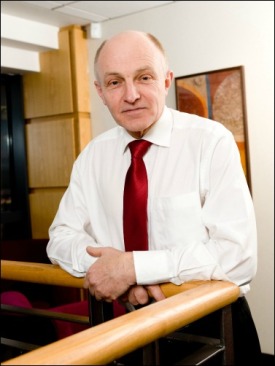Moving beyond “them and us”
I was struck by the recent attack on the Belfast synagogue on the Somerton Road which resulted in two broken windows, smashed on two separate occasions over the past weekend. The PSNI said the first window was broken sometime between Friday evening and Saturday morning by a number of unknown individuals. The incidents are being treated as religiously-motivated hate crimes.

What struck me was the link made by the media outlets between the attack and the current escalation of violence between Israel and Palestine. It seems that our need to see “our cause” paralleled in the history of other nations is not only about making a political point, but has now taken on a much more sinister dimension with this recent anti-semitic attack. It is as though we are seeing the Israeli Palestinian conflict being carried out vicariously here. Does our need to brand every issue in terms of our own sectarian issues know no boundaries?
Following this unacceptable event, it was heartening to see excellent political leadership exercised by a number of public representatives, united in condemnation, despite their differing views on the resolution of the Middle-East conflict.
This got me thinking about the nature of leadership and the need to realise that it is not necessary to agree with someone’s point of view to be able to offer courageous leadership by supporting their right to express that view. So often we caricature our politics as “Orange and Green”, “Them and Us”, an engagement which offers a “zero sum” outcome. True and courageous leadership takes risks for the other. It explains what “we” can do for “you”, not because we hope to gain your vote, but because that is how good relationships are developed and how we can begin to live together based on an acceptance and an agreed notion of the common good. Legislation, whether it is Equality or Human Rights based, can assist us in developing a society which operates on the basis of the common good and how we might negotiate that perilous path between rights and responsibilities. Legislation cannot, however, alone deliver a more equal and just society as that requires a change in how we do things, how we think about things and just maybe how "we" might do things for “them”.
So, lest we feel ourselves being drawn into a zero sum discussion about how we celebrate our past, or cultures, our firmly held beliefs, what flags we identify with, perhaps it is time to take a step back and ask how we would like to be treated by others and then begin by treating others in that fashion. Leadership doesn’t begin and end on the Hill. Each of us can take one small step towards creating a united community for all, where attacks on religious and cultural spaces, and indeed homes, will be relegated to our past. Rosa Parks once observed "Racism is still with us. But it is up to us to prepare our children for what they have to meet, and, hopefully, we shall overcome" that sentiment and aspiration lives on and we should rise to the challenge.
Posted on 24 Jul 2014 by
Dr Michael Wardlow